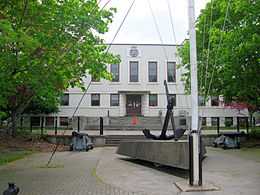HMCS Carleton
 | |
| Career (Canada) | |
|---|---|
| Name: | HMCS Carleton |
| Namesake: | Guy Carleton, 1st Baron Dorchester |
| Commissioned: | November 1941 |
| Motto: | Vincemus Armus (With These Arms We Conquer) |
| Honours and awards: | Lake Champlain, 1776 |
| Fate: | Active in service |
| General characteristics | |
| Class & type: | Naval Reserve Division |
| Type: | Stone frigate |
| Complement: | 230 |
Coordinates: 45°23′42″N 75°42′23″W / 45.39511°N 75.70652°W HMCS Carleton is a unit of the Canadian Forces Naval Reserve based in Ottawa, Ontario, with approximately 230 primarily part-time sailors.
History
In 1923, the Royal Canadian Navy Volunteer Reserve (RCNVR) was established. This Reserve Force was organized into companies and half companies located in fourteen cities across Canada. In 1935, the name of the Ottawa Half-Company was changed to the "Ottawa Division of the RCNVR".
Just prior to Canada's declaration of war on Germany, the government called the Reserve into active service. For the duration of hostilities, the Ottawa Division concentrated on the recruitment and basic training of seamen. By the end of the war some 4,620 officers and men had enlisted through the Ottawa Reserve Division.
On 1 November 1941, the Ottawa Division was commissioned as HMCS Carleton. It was named after HMS Carleton, a schooner which took part in the Battle of Valcour Island, in 1776, during the American War of Independence. The schooner was named after Governor Guy Carleton.
On 17 December 1943 HMCS Carleton moved to its current facilities at Canadian Forces Reserve Barrack Dow's Lake, when the new "stone frigate" was inaugurated in the presence of Major General Alexander Cambridge, 1st Earl of Athlone, Governor General of Canada. In 1944, a new type of naval presence was added to Carleton when the barracks blocks were occupied by the Women's Royal Canadian Naval Service (WRENS). New training facilities were then added to Carleton in the late 1940s and early 1950s.
Since its establishment, members of Carleton have played an active role in the National Capital Region. In recognition of its contribution to the community, Carleton was presented with the Key to the City of Ottawa in 1976.
Operations
Until September 2013, HMCS Carleton operated continuously to provide employment and training for its sailors. Its facilities consisted of an administration building, drill hall, classroom building, shooting range, boat shed and a large vehicle compound.
On 19 March 2008 several main supports for the roof of the drill hall failed resulting in its closure and then demolition, and this accelerated plans to replace the 65 year-old administration building and drill hall. Temporary office and classroom spaces as well as a temporary parade structure were installed on site. At the end of September 2013 demolition of the administration building began. A new administration building and drill hall will be built for HMCS Carleton. Expressions of Interest closed on Sept 9, 2009. However, construction has yet to begin.[1]
Although most of the sailors who are members of HMCS Carleton work on a part-time basis through the training year (September to May), there is a staff of ten full-time members (five Class B Reservists and five Regular Force) who ensure the efficient operation and administration of the unit.
HMCS Carleton has administration nights every Tuesday, and training nights on Thursdays from mid-September through to early May. HMCS Carleton also has weekend training throughout the year in order to augment training.
Commanding officer
The commanding officer is Cdr M.B. Mulkins.
Lodger units
- 30th Field Artillery Regiment, RCA
- Royal Canadian Sea Cadet Corps Falkland
- 2317 30th Field Regiment Royal Canadian Army Cadet Corps
- Navy League Cadet Corps Vice Admiral Kingsmill